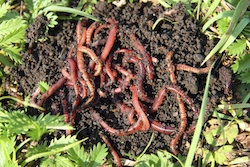SAGE Advice: April 2011 Archives
Approximately 97% of the 34 million tons of food waste generated annually in the US is thrown away, making food waste the single largest component of the waste stream reaching American landfills. But food waste doesn’t have to go into the garbage—most excess food can be recycled as compost and turned into very rich soil. Compost is often created outside in piles or bins, but many of us live in apartments with no backyard. What’s a conscientious city-dweller to do? Try vermiculture!

Vermiculture, also called vermicompost, is a small scale, indoor composting system that uses worms to turn organic waste like food scraps, coffee grounds, and paper into soil. Vermiculture is unobtrusive and fun and produces nutrient rich soil in 2 to 4 months—perfect for houseplants and seedlings.
You can either make your own vermicompost system or buy a start up kit. To make your own, begin with a sturdy plastic bin or wood box, add newspaper bedding, a few handfuls of soil, and worms. The worms aren’t the ones found in your garden—they’re called red wigglers and are sold locally by Windy City Worms. Windy City Worms also has complete start up kits available as well as delivery options. Unlike pets, the worms don’t require frequent tending, making them perfect for college life and office environments, as leaving them for a couple of weeks isn’t an issue.
For more detailed instructions on starting and maintaining your own vermiculture, check out the Chicago Recycling Coalition’s instruction manual or One Change’s DIY guide.
- Madelyn Freed
